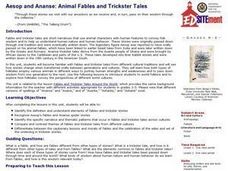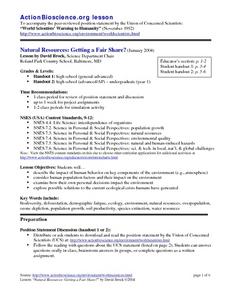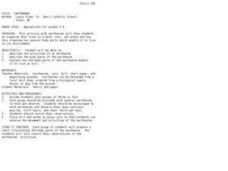Curated OER
Intolerance in American History
Examine the United States through the lens of intolerance using this 2-week unit plan, which includes details for 13 days of instruction. Scholars study examples of prejudiced behavior throughout history, discuss issues in groups,...
Curated OER
Aesop and Ananse: Animal Fables and Trickster Tales
Students complete compare and contrast activities dealing with fables and trickster tales to determine how each uses animals to portray human characteristics, specifically strengths and weaknesses, as well as pass wisdom from one...
Curated OER
Introducing Topographic Maps: Guiding Students from Concrete Models to Graphic Representations
Young scholars interpret topographic maps and infer human activity as it is influenced by the landscape.
Curated OER
Go Fish!
So much science in one tiny fish! Introduce young biologists to the zebrafish, a common aquarium inhabitant. The small, unassuming organism presents an opportunity for learners to study habituation using an easy-to-care-for species. Lab...
Curated OER
Natural Resources: Getting a Fair Share?
Students explore the impact of human behavior on key components of the environment, examine how theirn own personal decisions have added to the problem, and explore possible solutions to the current ecological crisis.
Curated OER
Incident
Learners gain insight into human behavior from the study of literature. They read a poem and respond by creating a poem of their own. After a lecture/demo, students utilize a worksheet imbedded in this plan to help them compose an...
Curated OER
Stand Firm: Choice and Consequences
Students explore the Holocaust. For this world history lesson, students research Nazi oppression under Hitler's rule as they read Holocaust and Human Behavior and Facing the Lion: Memoirs of a Young Girl in Nazi Europe.
United Nations
Peace Worksheets
Children are the voice of the future—and they are the best chance the world has for international peace. Help them secure peace in their lifetimes with a lesson based on the history of the United Nations, which includes a space for...
Children's Commissioner for Wales
Special Mission — Our Rights
Introduce young learners to the list of children's rights as defined by the UN Convention on the Rights of the Child (UNCRC) with a series of activities that get class members thinking about what they need to grow up safely and happily.
Curated OER
Shaun Ellis: Leader of the (Wolf) Pack
Students react to a statement about living with wolves, then read a news article about Shaun Ellis and his time living with wolves. In this current events and wolves lesson, the teacher introduces the article with a discussion and a...
Curated OER
Gender Roles
Students explore psychology by answering gender study questions. For this sexuality lesson, students discuss the stereotypes often referred to men and woman and what the truth is about their characteristics and abilities. Students...
Curated OER
Earthworms
Learners observe and chart the body of earthworms. In this earthworm lesson plan, students each get their own earthworm to observe and play with. They then record the different body parts of an earthworm and the different behaviors they...
Curated OER
Horse Character: Ceramics Lesson
Animals oftentimes elicit various characteristics which make them symbolic or representative of human feeling, action, or emotion. The class creates horse characters out of clay to show character action and symbolism. This is a great...
Personal Genetics Education Project
Scientific Themes in Personal Genetics
Humans can be tested for the presence of the BRCA gene, whose presence is an indicator that they have a greater chance of acquiring breast cancer than someone without the gene. Viewers have an opportunity to explore how genes and...
Curated OER
Are Butterflies Free?
Students use remote sensing to study monarch butterfly migration and human interaction to save the Oyamel forest (Mexico) for butterfly and human habitation.
Curated OER
Geography/Current Events Project
Using the Balkan region as an example, fourth graders review the five themes of geography as a class. They identify the physical and human characteristics of a region before labeling the countries and landforms on a map. They then...
Virginia Department of Education
Ecosystem Dynamics
Searching for an eccentric way to enhance lessons on ecosystems while ensuring pupils remain creative and motivated? Upon viewing The Lorax by Dr. Seuss, designated groups design and construct a pop-up book that depicts the specific ways...
Cornell University
Light Waves: Grades 6-8
Explore the behavior of light with different materials. Collaborative groups determine whether certain materials absorb, reflect, diffract, or transmit light waves. They then measure the angle of incidence and angle of reflection.
Curated OER
Ecology
Learners explore, experience and experiment identifying the human impact on the environment of vegetative differences within the same biome. They assess what causes deserts, rain forests, savannahs, tundras and saguaros and how these...
Baylor College
Water in Your Body
Do you know how much water you have had in the last 24 hours? Do you know how much your body needs? In this hands-on activity, your class members will estimate how much water our bodies lose each day by filling and emptying one-liter...
Curated OER
Brief Encounter (Looking at Ourselves and Others)
Students participate in a simulation game in which they realize what it is like to be from another culture. They observe and describe different behaviors. They also examine values from other cultures.
Curated OER
Sunrise/Sunset
Third graders discovver what causes the dramatic colors of a sunset by seeing the changing color of light as it passes through a clear container of water to which milk is gradually added. They measure the liquids and observe what happens...
University of Kentucky
Beneficial Bug Scavenger Hunt
Many people think of bugs as annoying pests to be squashed, but most insects and spiders are beneficial, eating the actual pests or pollinating plants. After reviewing some of the common bugs in your area (they may differ from those...
Peace Corps
Brief Encounters
How are Pandyas different than Chispas? Explore cultural norms and societal behaviors with an engaging role-play activity. Split into groups of two hypothetical cultural groups, the formal Pandyas and the sociable Chispas, and another...
Other popular searches
- Human Behavior Steps
- Activities Human Behavior
- Human Behavior Lab
- Human Behavior and Instincts
- Understanding Human Behavior
- Seasons Human Behavior
- Human Behavior Theorists
- Genetics and Human Behavior
- Human Behavioral Patterns

























